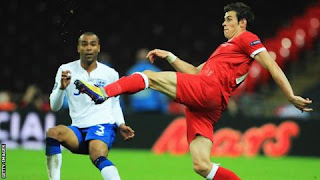Speaking ahead of his side’s 2-1 win over Slovakia in their Euro 2016 opener, Bale said that England, who Wales face in Lens on Thursday, “big themselves up before they’ve done anything”. It prompted Hodgson to shoot back that the Real Madrid forward had been “disrespectful”.
England midfielder Jack Wilshere upped the ante by declaring that the dislike between the countries was mutual.
England’s 1-1 draw with Russia in their first Group B game means that Wales will go into the match with the upper hand, which is not a position to which they are accustomed.
A goal by Thomas Heathcote Sorby earned England a 2-1 victory over Wales when the teams first met at London’s Kennington Oval in January 1879. It set the tone for much of what was to follow. In 101 meetings between the teams, England have lost on only 14 occasions.
Between 1946 and 1976 they tasted defeat just once in 33 encounters. Wales’s few wins have been celebrated exuberantly, most notably in the 1980 edition of the now-defunct British Home Championship, when an England team that had beaten world champions Argentina four days earlier was thrashed 4-1 at Wrexham’s Racecourse Ground.
In the main, however, England have had things their way. This century, the teams have only met four times and England have won all four games without conceding a goal.
Historically, the relationship between the two nations has been one of English incursions and Welsh resentment, from King Edward I’s invasion of Wales in the 13th century to Prime Minister Margaret Thatcher’s war on striking Welsh coalminers in the 1980s.
Today, Wales answers to the British government in London, although it was given a degree of political autonomy by the creation of the Welsh Assembly in 1999. “Wales is administratively part of England and so Welsh national identity is a rather contested area,” Huw Richards, a Welsh journalist and academic, told AFP.
“An awful lot of Welsh national identity is tied into the relationship with England and is about not being England, being different.”


No comments:
Post a Comment